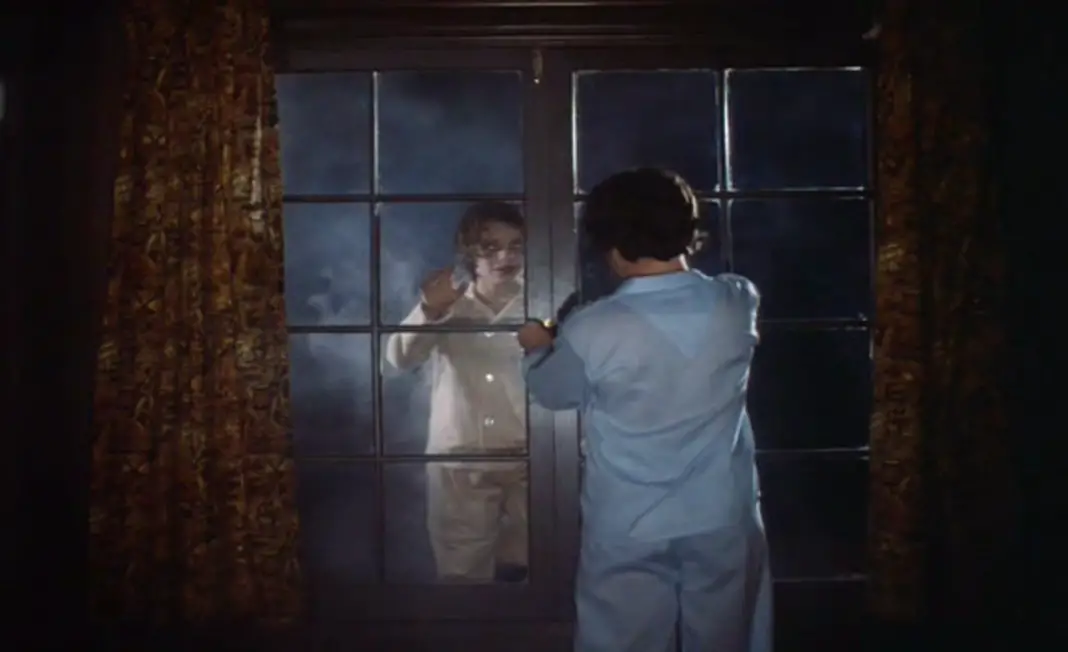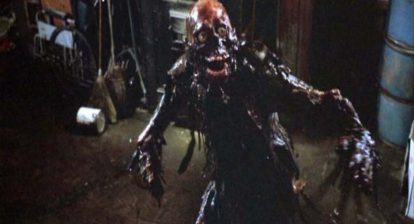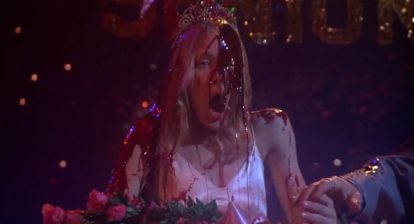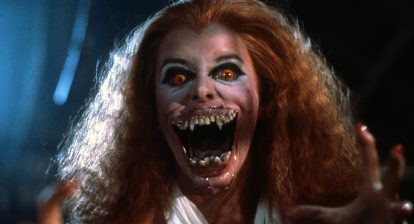John Carpenter, Wes Craven, George Romero, Tobe Hooper.
These weren’t just the first horror directors I knew, they were—other than Steven Spielberg—the first directors I knew, period. These were the first names of filmmakers that I ever learned and they have all had a tremendous, profound impact on me. I recognized these four people as icons from a very early age and will continue to do so for the rest of my life. Now, three of those four influential directors are no longer with us. The age of horror I grew up with is clearly phasing out. I’m still stunned by it. I don’t think the future of horror is in bad hands by any means. But it’s jarring to think that your idols are as human as any of us. We never think they can die and it’s always a shock to the system when they do.
I’ve written a lot about Tobe Hooper’s filmography over the years. While not everything has connected with me, I’ve always been fascinated with his filmography as a whole. Like all of the above directors, there’s one movie he’s most well known for. But Texas Chain Saw Massacre was not the first Hooper film I saw. It wasn’t even second or third. Unlike all of those other names, I got to know the man’s body of work before I actually saw his most famous feature.
As a child obsessed with Stephen King, Salem’s Lot was the one that had the most impact on me as a young fan. I watched it religiously in those days, even though it scared me so bad that I’d barely be able to sleep. It haunted me, but it fascinated me at the same time.
As much as I love Fright Night and all things Dracula, Tobe Hooper’s adaptation of Salem’s Lot almost singlehandedly sparked my lifelong obsession with vampires. The Glick boys tapping against windows, eyes gleaming, fog rising up behind them—these are still some of the most powerful images in horror history. And that’s not even mentioning Barlow, the Nosferatu-esque reimagining of King’s head vampire, still possibly the scariest vampire ever committed to celluloid.

Of course the debate has raged for years as to who actually directed it, but that really doesn’t matter now. Even if he was not calling all the shots, Tobe Hooper was absolutely a creative voice in that film. No one has ever denied that. He went into helping create one of the most powerful ghost stories of all time. Even if he’d only been a producer on Poltergeist, that would still be a worthy legacy.
And then, of course, there’s his masterpiece, The Texas Chain Saw Massacre. Enough has been written over the course of forty plus years as to what makes the movie so great, so powerful, why it’s had such a lasting impact. I can’t top any of that, but I will say that for me, Texas Chainsaw is as fascinating a cultural phenomenon as it is a film.
Many horror movies have been loosely based on a true story, but none have had people insisting that it happened exactly the way it was depicted quite like this one. People insist that they have a family member who shared a jail cell with Leatherface, or that their third cousin knew one of the victims.
 People even harassed Hooper for profiting off of real-life tragedy when, in fact, it had never happened at all. There’s no better legacy for a horror director than that. Scare people so much that they not only believe it’s real, they believe it so much that they hate you for making it.
People even harassed Hooper for profiting off of real-life tragedy when, in fact, it had never happened at all. There’s no better legacy for a horror director than that. Scare people so much that they not only believe it’s real, they believe it so much that they hate you for making it.
Even when it comes to what’s presented on the screen, people have wildly different ideas on what Texas Chain Saw Massacre represents, what it means or doesn’t mean. In actuality, it doesn’t mean anything, it’s simply a presentation of worse-case scenarios. It is exactly the tragedy that befell a group of fives youths that the opening narration presents it to be. That doesn’t make any interpretation of it wrong, of course. The genius of Chain Saw is that it’s still open to all of that. Hooper had even admitted in the past that some of the meat industry commentary was especially valid.
The beauty of all these conflicting opinions and interpretations is that Hooper himself eventually got to comment on them with his exceptional, underrated follow-up The Texas Chainsaw Massacre 2. It’s a completely different movie than the first and that’s the whole point.
 People thought the first was the goriest movie ever made when, in fact, it barely contained any gore. So the sequel amps up the blood by the gallons. People thought it was a commentary on Vietnam, they thought it was a commentary on the meat industry, they thought it was a dark satire of the American Dream, or a psychosexual feature about a man charging at a vulnerable woman with a massive, phallic weapon.
People thought the first was the goriest movie ever made when, in fact, it barely contained any gore. So the sequel amps up the blood by the gallons. People thought it was a commentary on Vietnam, they thought it was a commentary on the meat industry, they thought it was a dark satire of the American Dream, or a psychosexual feature about a man charging at a vulnerable woman with a massive, phallic weapon.
The sequel is all of these things, intentionally and overtly, beating you over the head with each one of those points and it’s absolutely brilliant because it’s basically saying, “Here’s what Texas Chainsaw Massacre would look like if it was what you all thought it was.”
These are just four of my favorites from a man who never quite got the reverence he deserved—even by myself, admittedly. During his lengthy career Hooper gave us some incredibly eccentric, energetic movies. Films so powerful that they almost feel like they’re actually alive.
 Funhouse is slow, but deliberately paced, walking a fine line between wallowing in the dirt and approaching something close to elegance. Lifeforce is underrated even now. It’s bizarre, awkward and intentionally so. Body Bags, Toolbox Murders—Tobe Hooper is one of the directors who’s career has always been somewhat taken for granted. You have to step back and look at that filmography to truly appreciate how fantastic, diverse and refreshingly weird it is.
Funhouse is slow, but deliberately paced, walking a fine line between wallowing in the dirt and approaching something close to elegance. Lifeforce is underrated even now. It’s bizarre, awkward and intentionally so. Body Bags, Toolbox Murders—Tobe Hooper is one of the directors who’s career has always been somewhat taken for granted. You have to step back and look at that filmography to truly appreciate how fantastic, diverse and refreshingly weird it is.
So, farewell Tobe Hooper. I never thought we’d lose you. I’d say “I don’t know what we’d do without you”, but the truth is that filmmakers like Hooper leave a legacy behind that will never go away. Texas Chain Saw Massacre will continue to inspire filmmakers decades from now, as it has for almost fifty years. As hard as it is to lose an icon, the man gave us some all-time greats. He lived a long and impressive life and much as that loss stings, it’s at least great to see the man finally start to get the recognition and respect that he’s deserved for so long.






